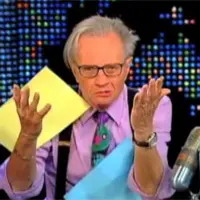Larry King belongs on a Mount Rushmore of TV personalities with Alex Trebek and Regis Philbin
-

The broadcasting icon, who died Saturday at age 87, "was a figure so central to the daily existence of some audiences that his mere presence constituted a tether to reality; if you put him on-camera as himself, even discussing something as outlandish as a rise in paranormal activity in New York City, he acted as a one-man grounding device," says Daniel Fienberg in an appreciation of King. "It's a type of fame that borders on unique, one very different from the fame achieved by even the biggest movie stars. It's a fame acquired via thousands upon thousands of hours of an unwritten contract with audiences. In the past six months, we've lost three figures who had that type of ubiquity — figures so excellent at what they did that they transcended their occupation and became avatars for something much bigger. If you were making a movie or television show in the past 40+ years, having Regis Philbin, Alex Trebek or Larry King make a cameo as themselves became a shorthand to signal to your audience that your fictional universe and their real universe intersected. They hobnobbed with Muppets, were sketched into The Simpsons and were affectionately parodied on Saturday Night Live. If there's a Mount Rushmore of personalities whose appearances as themselves formed a complex tapestry interweaving fact and fiction, Philbin, King and Trebek share it with the same humility they often conveyed on-screen. The fact is that you can't reach that rare "As Himself" tier if you aren't tremendously good at your job and, perhaps even more than that, if you aren't tremendously committed to your job. We speak of the Philbins, the Trebeks, the Kings in terms of a mind-boggling volume of work, held to consistent standards over decades. Trebek hosted over 8,000 episodes of Jeopardy! Philbin holds a literal Guinness World Record for most hours on U.S. television. Again, it's not enough to simply be famous or excellent. Television is a medium characterized by its omnipresence and serial nature — by the way that, unlike a movie or a movie star, a TV host could be part of your morning routine or your dinnertime ritual every night."
ALSO:
- Larry King's microphone stood for a very rare virtue: listening: "Listening, and its nearly extinct counterpart: a genuine, unflagging curiosity about someone other than yourself," says Hank Stuever. "The microphone, like the man hunched over it, imparted a corny notion of importance, an attempt to lend authority over the still-nascent cable feed of the 1980s. The microphone made all Larry King Live interviews seem like a great get, a worthy exclusive, a hot insight, something you’d better watch if you wanted to keep up. King’s life could be written as one man’s determination to keep up, for an audience that always knew he was pretty much winging it — and loved him for it. Some of King’s gets were better than others, of course (not every night could have Marlon Brando; not every night could feature Israeli Prime Minister Yitzhak Rabin, Palestine Liberation Organization leader Yasser Arafat and Jordan’s King Hussein historically united on the same show in 1995. Not every night could be Vladimir Putin or Ronald Reagan, Lady Gaga or Muhammad Ali, Miss Piggy and Kermit, Paul and Ringo), but his show was invariably, relentlessly topical. It was broad in a time of wondrous broadness, before the disrupting rise of the niche market. To be sitting at the table on CNN’s Larry King Live — just you, him and the big old mic — was proof that one had truly arrived. The suspenders. The odd questions. Why, King wanted to know. His favorite question, because that’s all any of us ever really want to know: Why?"
- Conan O'Brien pays tribute to Larry King: "We had an interesting relationship at this show with Larry for many years": Since 1994, King was a frequent guest on Conan's various talk shows. From demanding Conan freeze his corpse to participating in the "In the Year 2000" sketch to doing his show from Conan's rafters, King was always game for Conan's wacky ideas. "Of course everyone knows him as this consummate interviewer, this legendary broadcaster: He talked to everyone, just a giant in the talk-show industry," said Conan in a tribute on Monday's show. "But, on a more personal note, we had an interesting relationship at this show with Larry for many years. For some reason, we don't know why, he felt very comfortable coming to us and letting his comedy side come out." Conan then showed a compilation of his favorite Larry King moments.
- Former Larry King Live producer says King never had an agenda: "You never knew if he was a Republican or a Democrat," said Wendy Walker, who worked on the CNN show from 1993 through 2010. "Both Republicans and Democrats liked him.... When he did an interview, he made it all about the other person. He never said, ‘Me, too.’... He walked into the White House like he was walking into an In-N-Out Burger. He wasn’t in awe."
- Responding to backlash, Piers Morgan insists he was paying tribute to King with his "mother-in-law" quip
- Martha Stewart recalls going on a date with King: "I thought it was a business date, but turned out it was sort of a dinner date"
TOPICS: Larry King, CNN, Conan, Larry King Live, Late Night with Conan O'Brien, Alex Trebek, Conan O'Brien, Martha Stewart, Piers Morgan, Regis Philbin
More Larry King on Primetimer:- Sean Hannity breaks Larry King's record as the longest-running primetime cable news host
- Alex Trebek and Larry King win posthumous Daytime Emmys
- Daytime Emmys reveals plans to honor TV icons Regis Philbin, Alex Trebek and Larry King
- Alex Trebek and Larry King earn posthumous Daytime Emmy nominations
